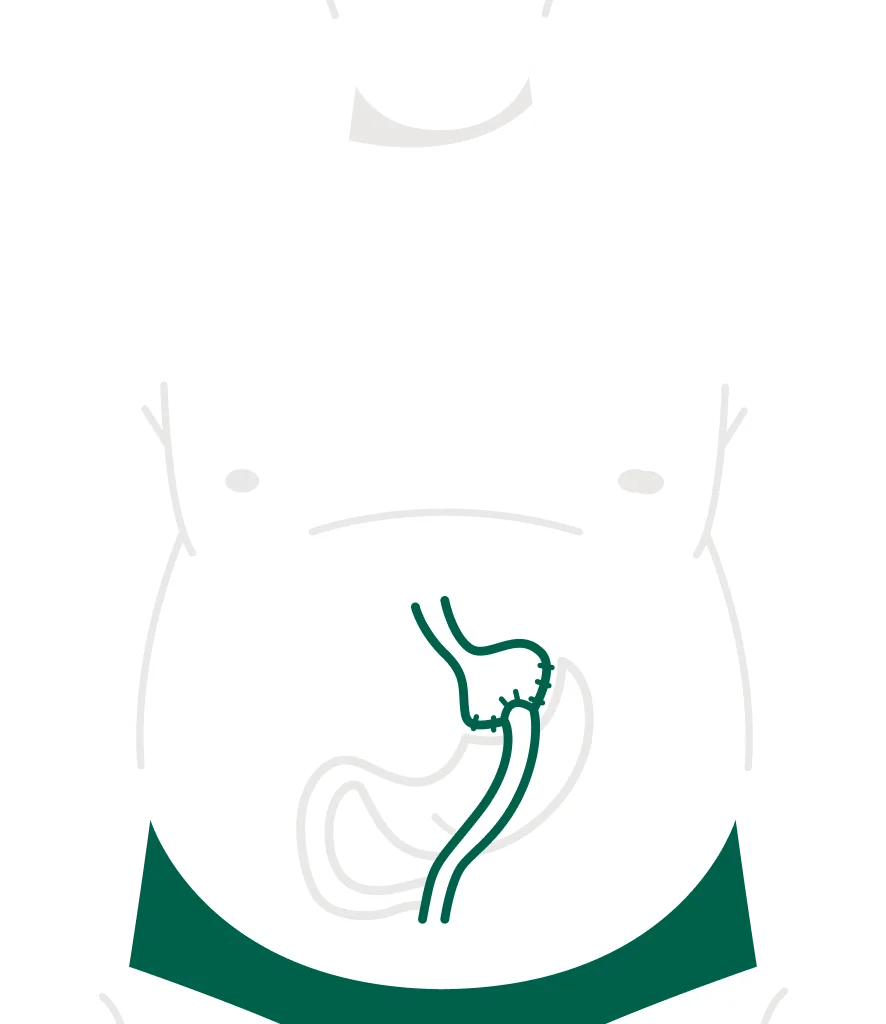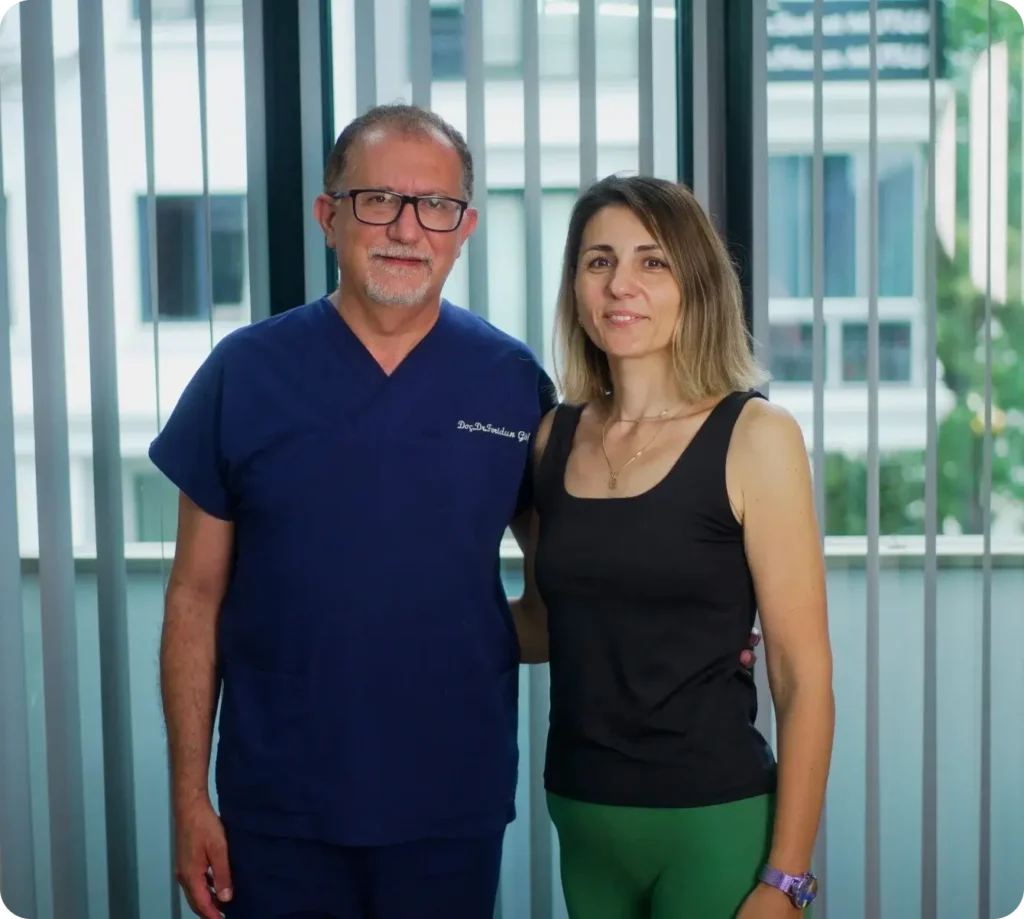

The gastric bypass – also known as the Roux-en-Y gastric bypass – combines stomach reduction with a shortened passage through the small intestine, reducing the surface area available for nutrient absorption. In particular, the absorption of fat and protein in the intestine is reduced. Overall, the gastric bypass has a positive effect on hormonal balance – for example, by increasing the amount of insulin released to regulate blood sugar levels.
Gastric bypass surgery has been proven to be an effective treatment for obesity for many years. The first procedure of this kind was performed as early as 1966. There are different variants of gastric bypass surgery, which are selected depending on the patient’s state of health. Gastric bypass surgery is a complex operation that you should ideally entrust to an experienced specialist like Dr. Gökçe!

Then you should choose a different treatment. The benchmark for a gastric bypass is a BMI of 40 (from 35 with concomitant diseases such as diabetes, high blood pressure or sleep apnea).
Gastric bypass surgery is preferably performed on younger patients, especially those with type 2 diabetes or gastroesophageal reflux disease.
A gastric bypass cannot be performed if there is gastritis or bacterial infection that could lead to gastric ulcers.
Various mental and physical conditions may make it necessary to avoid a gastric bypass.

75%

"*" indicates required fields
A gastric bypass is one of the most commonly performed types of bariatric surgery to treat obesity. This procedure combines stomach reduction with a rerouting of part of the small intestine. This dual approach not only limits food intake but also reduces calorie and nutrient absorption. Two trusted methods, the Roux-en-Y gastric bypass and the mini-gastric bypass, are frequently performed by skilled bariatric surgeons like Dr. Gökçe.
A gastric bypass procedure is ideal for patients with a body mass index (BMI) of 40 or higher. It can also be beneficial for individuals with a BMI of 35 or above if they suffer from obesity-related conditions such as type 2 diabetes, high blood pressure, or sleep apnea. Patients who have not achieved sustainable results through diets or other measures often benefit the most from this procedure.
This surgery is not only for individuals with severe obesity but also for those with health problems linked to their weight. A gastric bypass can significantly improve overall health and quality of life, making it a transformative option for many.
Choosing weight loss surgery in Turkey comes with many benefits. The gastric bypass prices in Turkey are significantly lower than in many Western countries, despite offering high-quality medical care. Clinics, such as those led by Dr. Gökçe, provide comprehensive packages covering everything from pre-surgery assessments to follow-up care.
With state-of-the-art facilities and highly experienced bariatric surgeons, Turkey has become a leading destination for medical tourism. Patients can combine life-changing treatment with an affordable, comfortable experience.
After a gastric bypass, patients need to adjust their diet to ensure they get the necessary nutrients despite reduced food intake. Supplements like vitamin B12 are often essential to prevent deficiencies. Regular physical activity and maintaining a healthy lifestyle are also crucial for long-term success.
Most patients experience a short hospital stay and are able to start resuming light activities within a few weeks. Significant weight loss typically occurs within the first 12 to 18 months, with patients losing 60 to 75% of their excess weight. These results make the gastric bypass one of the most effective options for those looking to lose weight and improve their overall health.
During the surgery, the stomach is surgically reduced to a small pouch, leaving the rest of the stomach inactive. This pouch is then connected to the small intestine, bypassing a significant portion of it. This anatomical change limits calorie absorption and positively impacts hormone regulation, which is particularly beneficial for patients with type 2 diabetes.
A gastric bypass is suitable for severely overweight individuals (BMI ≥ 40 or ≥ 35 with concomitant diseases) who have not been able to achieve sufficient weight loss despite dieting and other measures and who have health risks due to their excess weight. Depending on the health and psychological conditions, a gastric bypass or another weight-loss surgery may be suitable.
Most patients lose around 60-70% of their excess weight in the first 12-18 months after gastric bypass surgery. However, success also depends on adherence to dietary and lifestyle guidelines after surgery. While the gastric sleeve primarily limits the amount of food you can eat, combining it with regular exercise and a healthy diet maximizes long-term success.
Possible risks of a gastric bypass include infection, bleeding, vitamin deficiency and complications in the digestive system. Regular follow-up care is necessary to detect and treat possible long-term problems early on.
Both the gastric sleeve and the gastric bypass are effective surgical procedures for weight loss, but they differ in approach. In a gastric sleeve, most of the stomach is removed, leaving a small, tube-shaped pouch. This limits the amount of food you can eat and reduces hunger hormones, helping you feel full faster. A gastric bypass, on the other hand, not only reduces the stomach size but also reroutes part of the small intestine. This means it also reduces calorie absorption in addition to limiting food intake. Your surgeon will recommend the most suitable procedure based on your health and weight-loss goals.
After any weight-loss surgical procedure, including a gastric bypass or gastric sleeve, significant dietary changes are necessary. Initially, you’ll follow a liquid diet to allow your stomach to heal. Over time, soft foods are introduced, and eventually, you can eat solid foods again. However, portion sizes will be much smaller due to the reduced stomach size. Patients need to eat nutrient-rich meals in small portions to ensure adequate nutrition. Overeating is not advisable, as the smaller stomach can only hold a limited amount of food. Nutritional supplements, such as vitamins and minerals, are often required to avoid deficiencies.
A gastric bypass is a long-term weight-loss solution, but its success depends on the patient’s commitment to a healthy lifestyle. While the surgery permanently alters your stomach and digestive system, regaining weight is possible if healthy habits are not maintained. Following a balanced diet, eating appropriate portion sizes, and incorporating regular physical activity are crucial for sustained results. The same applies to a gastric sleeve; success is tied to how well you adapt to and maintain the recommended lifestyle changes.
Get advice from your expert in weight loss surgery in Turkey: Dr. Gökçe!